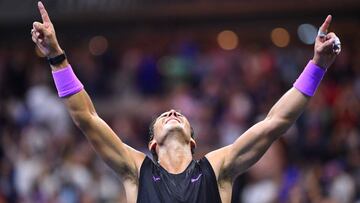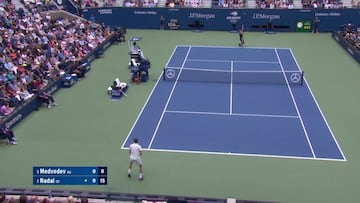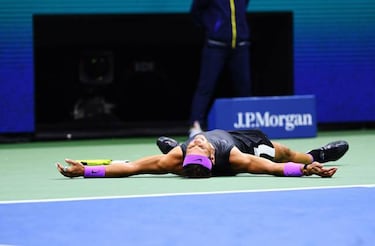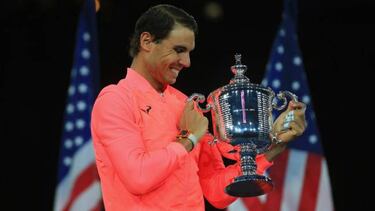Rafa Nadal: 19 reasons for 19 Grand Slams
The Spaniard lifted his 19th major at the US Open at an age when many players have called it a day. We look at 19 qualities that have added to his longevity.

In sport, things rarely happen by coincidence. And in an individual sport like tennis even less so, with the same small collection of players winning the vast majority of the Grand Slam tournaments over the last decade. Rafa Nadal, who lifted his 19th major title overall at the US Open to move within one of Roger Federer’s all-time record of 20, is a compendium of qualities that makes him an almost unique competitive machine.
Here we lay out 19 reasons why the Spaniard has managed to overcome injury and the fierce competition at the top of the men’s game to reach his incredible haul of Grand Slam titles.
1: Consistency
The solidity and consistency of Nadal’s style of play is one his trademarks. His ability to endure the long and draining rallies that characterize modern tennis are second nature to the Spaniard, who boasts an enviable array of shots, spin and changes of pace.
2. Intensity
Nadal starts every game with his routine in the player’s tunnel and goes into every match imposing a punishing rhythm from the first to last point, whether it is a first-round encounter or a final. His extreme levels of performance are epitomized by a barrage of shots that lead to many of his opponents collapsing.
3. No surrender
Nadal does not give quarter. His self-confidence and belief that he can turn any adverse situation around, however desperate the situation seems, is another of his strong suits. His opponents know they cannot relax for a single point, and if they do so they will pay the price. He remains dangerous even when the score board is completely against him.
4. Point by point
Although it is stating the obvious, in tennis winning a series of points consecutively is key. At the very least, a player has to win two points in a row to seal a game. But Nadal does not pay much heed to the score and doesn’t relax when he holds an advantage. He affords every point the same level of importance, which requires him to expend more energy but also makes him more effective and allows him to control the flow of the match.
5. The battle of the mind
Nadal has a whole book of knoweldge and shots in his head that reduces the mental strain at key moments and allows him to maintain a high level of accuracy when it comes to decision-making. He plays almost from memory, on the offensive and on the back foot. His ability to save break points is extremely high and his clarity in analyzing games in post-match interviews is an indicator of his understanding of the intricacies of the game.
6. Competitiveness

Nadal always wants to win, at whatever he is playing and against whomever he is playing, whether it’s a board game between matches, on the Play Station or even when challenged by John McEnroe to hit a ball into the commentary box in front of 20,000 spectators. He has an intrinsic competitive spirit that has been honed through years of training. There are few players to have beaten him, and even fewer to have done so more than once or on a regular basis.
7. Key moments
Tennis is one of few sports where a player can win despite claiming more points overall than their opponent (the last Wimbledon final is an example). The key points in a set are the ones that make the difference in terms of motivation, morale and of course the final result. In that respect, Nadal stands out. His management of pressure and emotional control are exceptional. It’s very rare to see him crack or commit significant errors.
8. Physical power
Intensity, consistency, and his bossing of games – Nadal has few peers in his movement across the baseline – have shaped Nadal’s physique. It’s hard to find a similar blend of pure power, resistance and capacity for recovery. He manages his explosive shot-making by taking full advantage of the 25-second serve clock and is able to keep a point going from four feet behind the baseline.
9. Tactical preparation
Nadal leaves little to chance and prepares meticulously for every game with his team, even if his wealth of experience has made him more autonomous in that respect. Analysing the strengths and weaknesses of every opponent allows him to go onto court with a clear game plan and a list of alternatives if that doesn’t work.
10. Reading of the game
In tennis, a player faces the opponent and themselves. Coaches are always looking for ways to get messages to their players but it is more and more difficult in modern tennis and what does sneak through is basic in the extreme. In this aspect, Nadal holds an advantage. He is able to work out in a millisecond what is working and what isn’t, as well as spotting what is getting to his opponent most effectively.
11. No free points
To beat Nadal, you have to beat him on every point, either through hitting winners or forcing errors. Given his tenacity, that turns every point into a dogfight, with the mental and physical exertion that requires. Some players may take their foot off the pedal on a receiving game if they hold an advantage. You won’t even get the time of day from Nadal.
12. Self-focus

Nadal was taught from a Young age to focus solely on the game at hand and whatever is under his control. His tactical, technical and mental levels are sufficient that he is not distracted by wind, heat, cold or the player in front of him going on a run of winners. He doesn’t look for excuses, just ways to improve what he is doing or to get out of a rut.
13. Self-criticism
With excuses laid to one side, Nadal is his fiercest critic. He is never satisfied and identifies what he should have done, should not have done and what was in his hands to change.
14. Flexibility
Despite being the undisputed greatest clay courter of all time, Nadal is more than that as his Career Slam shows. His ability to alter his routines on all the different surfaces has been aided by his occasional dip into doubles and although he is clearly most at home on clay, he is fifth on the all-time list of players with the highest number of Slam finals on hard courts and ahead of Andy Murray, John McEnroe and Stefan Edberg.
15. Court coverage
Nadal’s defensive qualities are well-known and he always obliges his opponent to his several shots in search of a winner. The ball always finds a way back over the net. This ability, aligned with his physique, gives him an advantage on the four large main courts at the Grand Slams. His footwork is so god that he can often turn a defensive point into an attacking one and his angled shots always keep his opponent on the run.
16. The impossible shot
Nadal’s formative coach and uncle, Toni, recently told AS that one of his nephew’s most potent weapons is his ability to hit the ball solidly even from the most disadvantageous position, be it a bad bounce or while off-balance. He probably has no peer in this respect. And when he pulls off one of his impossible shots, the effect on his opponent is demoralizing.
17. Continuous improvement

The 2019 version of Rafa Nadal is a considerably better player than the teenager who won Roland Garros in 2005. Driven by his long rivalry with Roger Federer and Novak Djokovic, his tennis has evolved in every aspect. Worthy of special mention is his serve, his inside-out backhand (one of his best shots today) and his net play.
18. Discipline
Related stories
Toni Nadal instilled in his nephew a discipline and routine that has made him the player he is today. While the majority of players train until things go well, they did so with the goal of making sure never went badly. The effect has been game-changing because plays like he trains and converted him into the consummate professional on and off-court and given him a competitive advantage over the younger players.
19. Commitment
Like Federer and Djokovic, Nadal lives for tennis above all else and dedicates his body and his soul to it. He started his professional career in 2001 at the age of 15. 18 years later he retains the same motivation, drinking in every victory and living the emotions and experiences that tennis provides.

